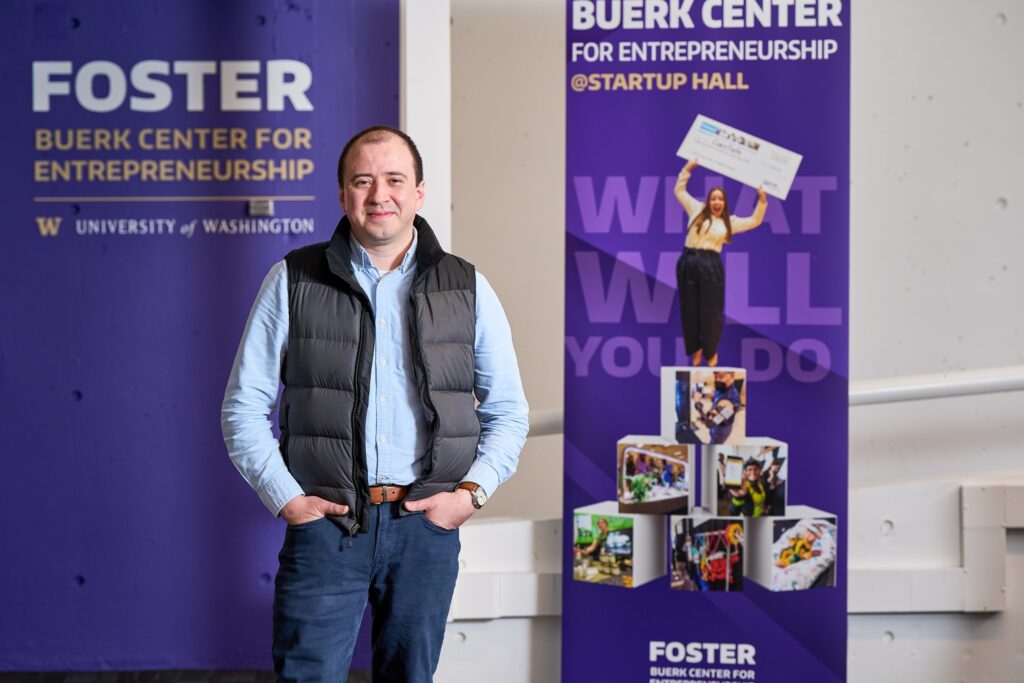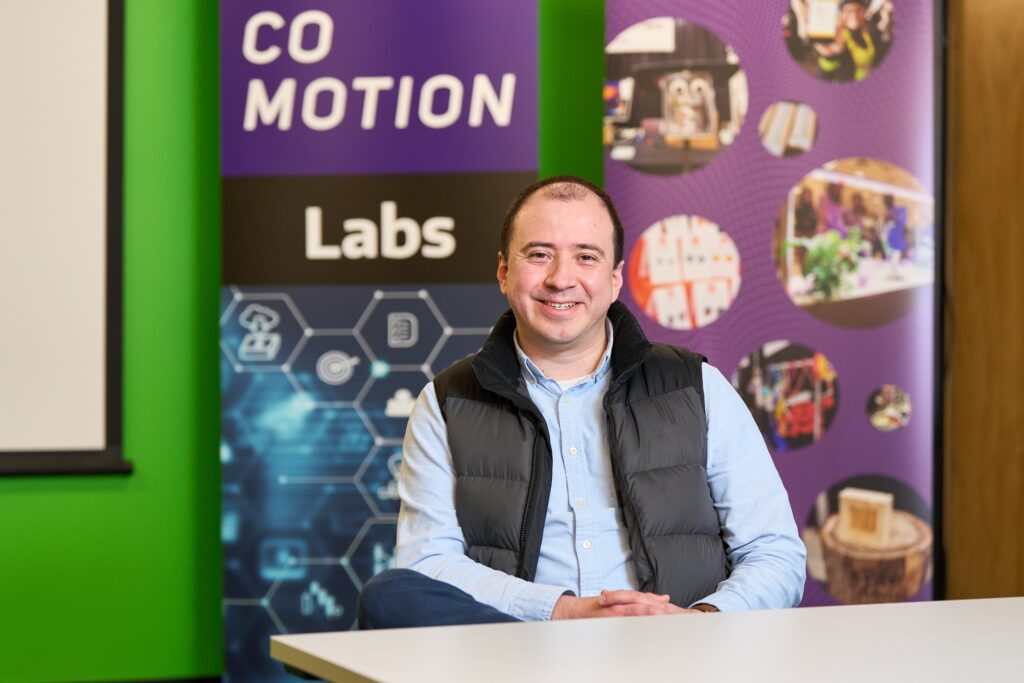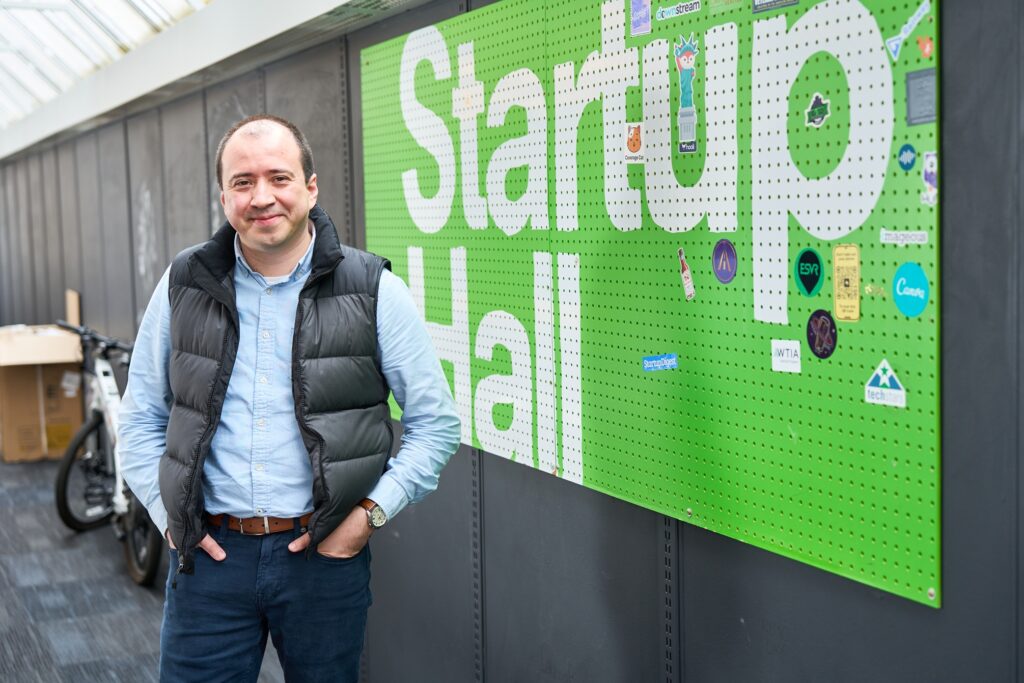Coding Confidence: Alan Gonzalez Is Building a Better Way to Hire
How Foster’s Master of Science in Entrepreneurship program inspired a smarter approach to hiring in tech
Before writing a single line of code for his current startup, Alan Gonzalez (MS 2022) tested the concept with a clickable PowerPoint.
It was a shift in approach—one Gonzalez credits to the Master of Science in Entrepreneurship program at the Foster School of Business. Instead of diving straight into development, he focused on validating the idea first. That idea would become DevMatch, a platform that helps companies evaluate software engineers based on real-world coding tasks rather than abstract technical puzzles.
Gonzalez didn’t arrive at Foster planning to launch DevMatch. He initially started the Master’s in Entrepreneurship program with a different concept: an e-commerce tool offering Backend as a Service (Baas) for custom storefronts. But after devoting a full year to product development, he discovered a variety of well-funded startups solving the same problem, with high-profile partners and customers. Rather than push forward, he pivoted. And thanks to an Opportunity Recognition and Validation course with Foster School Associate Professor Emily Cox Pahnke, he did it with a new mindset.
“Before the entrepreneurship program at Foster, I’d jump straight into coding,” he says. “With DevMatch, I built a clickable prototype and used that to test the idea. I learned that you don’t need to start with building, and the customer can come before you have a product. You need to start with testing.”

Testing engineers on real-world skills
Gonzalez has been coding since he was eight and has held various tech roles, including one at Microsoft. Like most software engineers, he went through hiring processes that involved weeks of studying technical challenges—only to land jobs that had little connection to the problems used to assess his skills.
“You’re being assessed on things you don’t actually do day to day, with unrealistic expectations of precision, time, and pressure. That’s just not what the job is about,” he explains. “You prepare for months with algorithmic questions, and once you’re hired, you seldom use them again. I found that strange, but it had become a well-known problem in the industry.”
DevMatch was born from that observation. Drawing on his earlier work building a nonprofit platform for crowdsourcing coding challenges, Gonzalez created a tool that flips the traditional hiring process. Instead of testing abstract logic puzzles, companies using DevMatch can evaluate candidates based on simulations of the work they’ll actually do.
“You get people who can pass interviews but aren’t great engineers, and others who are great engineers but can’t pass the interview,” he says. “DevMatch aims to fix that.”

Two startups, one approach
Today, Gonzalez splits his time between DevMatch and a second startup, Propio, where he serves as CTO and co-founder. Propio helps accountants automate routine tasks using AI, improving accuracy and freeing up time for more complex work and client interactions.
While the two companies are distinct, they share a product-led, problem-solving mindset—one Gonzalez attributes in part to his time in Foster’s Entrepreneurship program and the broader entrepreneurship community at the University of Washington. He credits inspiration from startup competitions, the Buerk Center for Entrepreneurship’s Jones + Foster Accelerator Program, and a “mind-blowing class” taught by Seattle venture capitalist Greg Gottesman, co-founder and managing director at startup studio Pioneer Square Labs (PSL), along with Ed Lazowska, a longtime computer science professor at UW.
At both startups, he plays a leadership role in product development, applying the same structured approach to testing and iteration that he learned in the entrepreneurship program. In early 2025, he was honored in the Puget Sound Business Journal’s 40 Under 40 list.
“If I were doing two totally different roles, I couldn’t manage it,” he says. “But because both center on technology and product, it works.”
The connection between the two ventures goes deeper. Gonzalez launched DevMatch while working out of CoMotion Startup Hall, an innovation space affiliated with the University of Washington. There, he landed his first DevMatch customers—fellow founders he met at the coffee machine down the hall. It was also where he met the team behind Propio.
“We started talking, then collaborating, and eventually Rodrigo Carriedo, the CEO, asked if I wanted to partner,” he says. “That never would have happened if we hadn’t crossed paths at the University of Washington.”

Paying customers and meaningful milestones
Getting a new idea off the ground takes time—something Gonzalez quickly learned as a founder. Despite the myth of overnight success, his journey with DevMatch has been gradual. The work is fast-paced, but launching a viable business happens more slowly, as everything from product development to investor conversations and sales cycles comes together.
“You have to be mentally and financially prepared for that,” he says. “You need perseverance.”
One of his most rewarding moments was when DevMatch signed its first paying customer.
“For a long time, I was paying all the expenses out of pocket,” he recalls. “When that first payment came in, I turned to our designer and says, ‘This paycheck is coming from something we created. We built value.’ That was huge.”
Staying connected and giving back
Even as he juggles two startups and new parenthood (his daughter was born last year), Gonzalez has remained connected to the Foster School of Business community. He’s returned as a mentor, served as a judge for pitch competitions, and recently began teaching a Product Development Lab class at the University of Washington Bothell.
“I teach what I learned at Foster,” he says. “Start with ideas. Test before you build. Use design tools to prototype. Only then, when you have the right signals, do you move to the next step.”
He also sees entrepreneurship concepts as useful beyond startups.
“The frameworks we learned—testing, validating, building with purpose—apply to everything. Whether you’re in a corporate setting or launching something on your own, it’s the same process.”

Redefining success as a founder
As DevMatch grows, Gonzalez is thinking about the future of software engineering itself. With AI tools increasingly writing code, he sees an opportunity to rethink how both engineers and AI systems are evaluated.
“We’re moving toward a world where part of your job is reviewing code written by AI,” he says. “So now we’re exploring how to assess those skills. Eventually, we may even be interviewing the AI models themselves.”
Longer term, Gonzalez sees potential to expand beyond engineering to build assessments for finance, marketing, and other fields where real-world skills matter.
But even as he looks ahead, he stays grounded in what he values most: meaningful work, thoughtful iteration, and learning.
“I want to keep learning, keep teaching, and spend time with my family,” he says. “That’s success to me.”
Explore the Master of Science in Entrepreneurship program here.
